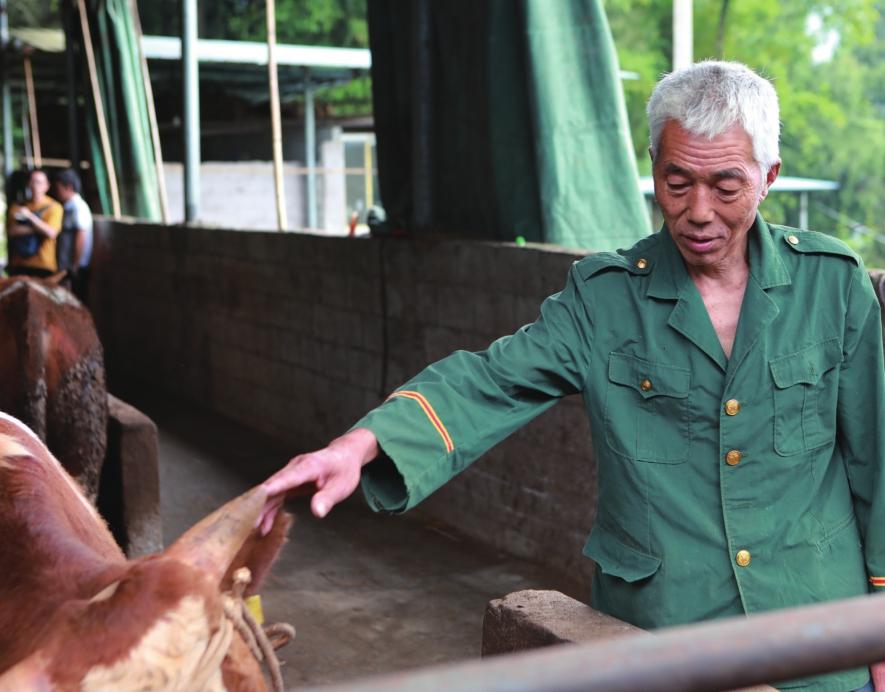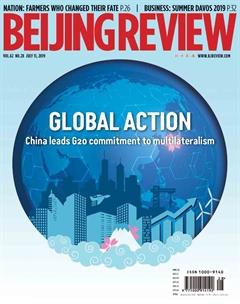From Poverty to Quality
By Wen Qing


Every year, when summer arrives, Fengdu, a county in Chongqing Municipality in southwest China, astonishes visitors with its stunning scenery: a vibrant leafy blanket of trees covers the surrounding mountains while sparkling rivers run through deep ravines under the canopy of a clear blue sky flecked with white clouds. When the rains arrive, a fi ne mist of spray covers the landscape, which looks like a traditional Chinese painting.
Ironically, in the past, the breathtaking scenery added to the local peoples woes. The towering mountains and steep gorges made the county difficult to reach, and lack of roads and transport led to a dearth of businesses and factories, which meant there were very limited employment opportunities. The lack of cultivatable land meant the farmers could not feed themselves by relying solely on agriculture. Due to all these factors, Fengdus economy remained backward.
Like Fengdu, many places in China remained trapped in poverty due to their disadvantaged geography. It was hard for the people living in such places to develop their economy by themselves as they lacked advanced concepts as well as the necessary investment.
However, after the Central Government set 2020 as the deadline to eradicate absolute poverty, the national taskforce for poverty alleviation identified the counties with the weakest economies and work began to pull them out of poverty with targeted measures and funds. Fengdu was one of these counties.
A new life
The changes in Zhang Jishengs life are a microcosm of the changes that overtook Fengdu. The 53-year-old first worked as a migrant laborer in the developed southeastern provinces. But after his wife developed mental problems in 2015, he came back to look after his family. He turned to growing corn but the income—2,000 to 3,000 yuan ($291-436) per year—was woefully insuffi cient.
To make things worse, his son, the apple of his eye, was also diagnosed with the same illness as his wife and Zhang began to contemplate a drastic measure.
“I thought maybe the three of us should take poison. Dying would be much easier for us than enduring the torture that life had become,” Zhang told Beijing Review.
At this critical juncture, the local committee of the Communist Party of China(CPC) and the local poverty alleviation group stepped in. “We raised the money to send Zhangs son to hospital,” Zhang Yuqun, a leader of the poverty alleviation group, said. “He had to pay only about 10 percent of the costs.”
Zhang Yuqun was originally working in a different place. She was sent to Fengdu to help with the poverty alleviation work. She is one of over 459,000 officials and personnel from state-owned enterprises and public institutions across China who have been deputed to regions in poverty since 2015.
Fengdu introduced policies to subsidize the medical expenses of impoverished families registered with the government. Now the families pay no more than 10 percent of the entire treatment cost should anyone fall ill.
“In the countryside, it is common for families to become poor and for those rescued from poverty to become poor again if a member of the family has a major illness,”Cao Ling, Director of the Organization Department of the CPC Fengdu Committee, said. “This policy ensures the basic medical service for registered poor families and reduces their burden.”
With Zhang Yuquns help, Zhang Jisheng applied for the subsistence allowance earmarked for counties under assistance and received 540 yuan ($79) per month in 2015. The allowance rose to 1,050 yuan ($153) in 2017. His wife and son too were able to get an additional allowance of 200 yuan ($29) each per month for the severely disabled.
Self-reliance
The Sichuan pepper is a traditional commercial crop in Zhang Jishengs hometown, Zhanpu Township. During harvest time the small town is redolent with the rich fragrance of the ripe peppers. “Planting Sichuan pepper can protect the environ-ment and also pull farmers out of poverty,”Xiang Hailin, mayor of the township, said.
In 2015, the local government began encouraging farmers to plant Sichuan pepper, providing them with interest-free micro loans. Zhang Jisheng applied for a loan of 30,000 yuan ($4,370) to buy fertilizers and pesticides and to hire pepper pickers.
“The government pays the interest on the loans, but the farmers must use the money to develop micro industries,” Xiang told Beijing Review.
Zhang Jishengs Sichuan pepper harvest brings him about 6,000 yuan ($874) per year. In addition, he has landed a new job.
“The government offered Zhang the job to clean the village on a salary of 1,700 yuan ($278) per month,” Zhang Yuqun said. Providing such public-service jobs to villagers has proved to be an effective method to increase the income of the impoverished while they also contribute to society, especially in areas with important ecological resources such as grassland, woodland, rivers and lakes.

